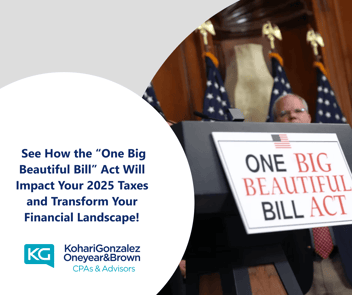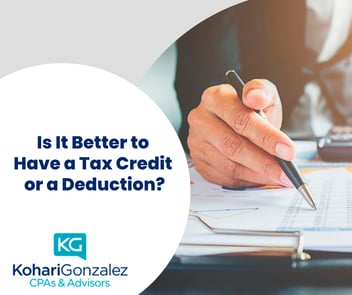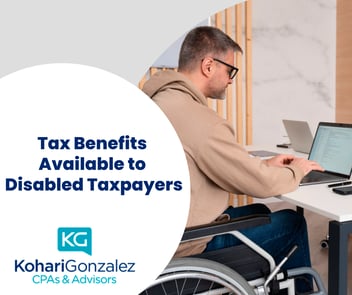
Article Highlights:
-
One Big Beautiful Bill Act
-
New Deduction for Seniors
-
New Gambling Loss Limit
-
Increased Standard Deductions
-
Tax Rates
-
Car Loan Interest
-
Charitable Deductions
-
Environmental Credits
-
Other, Not New, Prominent Tax Issues for Seniors
-
Qualified Charitable Distributions
-
Home Medical Modifications
-
Home Care
-
One Last Thing
In recent legislative developments, the Omnibus Budget Reconciliation Bill for 2025 and Beyond (also known as the One Big Beautiful Bill Act, or OBBBA) has introduced significant tax provisions, some of which are tailored to benefit seniors, ensuring they receive better support in managing their financial and tax obligations. One of the most significant changes is a new deduction accessible to those 65 and older, which provides a $6,000 deduction per qualifying filer, subject to certain income limits and joint filing requirements. As seniors negotiate these new opportunities, understanding the entire tax picture, including the consequences of changes to standard deductions, charity deductions, car interest deductions, and others, becomes critical. This article digs into the laws that are relevant to seniors, providing insights into optimising their tax strategy and ensuring compliance while maximising possible rewards.
New Senior Deduction: To help older taxpayers with their taxes, the OBBBA has introduced a new senior deduction. The intended exemption of Social Security income from taxes, which was not able to be enacted because of limitations in the Congressional Budget Reconciliation Process, is replaced by this deduction.
Anyone 65 years of age or older is eligible for the new senior deduction. When filing jointly, the deduction for married couples with both spouses meeting the age threshold is $12,000. The deduction for single taxpayers is $6,000. For individuals with a Modified Adjusted Gross Income (MAGI) of more over $75,000, or $150,000 for those filing jointly, this benefit starts to phase away. The deduction is lowered by 6% of the MAGI that exceeds the threshold under the phaseout calculation. For instance, a 65-year-old single taxpayer with a MAGI of $80,000 would have their $6,000 deduction lowered to $5,700. For married taxpayers earning above $250,000 and single taxpayers earning over $175,000, the deduction completely fades out.
As an above-the-line deduction, it can be claimed regardless of whether the taxpayer itemises or takes the standard deduction. This provision is effective for taxable years 2025 through 2028. Overall, the deduction is intended to reduce the financial burden for seniors who continue to receive taxable Social Security benefits, and it represents a legislative compromise to keep the budget balanced.
New Gambling Loss Limit: The new tax law modifications include a 0.5% floor on gambling losses, which will drastically alter how these losses are computed for tax reasons. gaming losses can now only be deducted to the extent of gaming income, as opposed to the previous limit of 0.5% of the taxpayer's adjusted gross income (AGI). Gambling losses are treated as a miscellaneous deduction when itemising, which a taxpayer should only do if their total itemised deductions exceed the standard deduction.
This has a significant impact on elderly recreational gamblers since gaming money affects overall taxation. Importantly, while gambling losses can reduce reported income, they do not apply when computing taxable Social Security benefits or Medicare Part B premiums. This means that the entire amount of gambling winnings is included in AGI, thereby increasing AGI levels and making more of a senior's Social Security payments taxable, resulting in higher Medicare Part B premiums.
This setup effectively serves as a hidden penalty for senior recreational gamblers, as the mechanics of these rules ensure that even if there is a net loss from gambling activities, the increased AGI can raise taxes and Medicare costs, undermining the financial relief typically associated with deducting losses.
Increased Standard Deductions: The OBBBA establishes and provides permanent higher standard deductions for elderly and other taxpayers. The new law raises the standard deduction by $750 for single taxpayers, $1,125 for heads of households, and $1,500 for married joint filers. Thus, in 2025, the standard deductions are set at $31,500 for married couples filing jointly, $23,625 for heads of households, and $15,750 for singles and married persons filing separately. For taxpayers 65 and over, these amounts are enhanced by $2,000 for single and head of household filers, and $1,600 per qualifying spouse for married filers. The increased standard deduction amount for seniors is in addition to the new senior deduction mentioned above.
These deductions are also adjusted for inflation, ensuring that seniors and other taxpayers continue to benefit from these increases in future tax years. By raising the standard deduction, the OBBBA hopes to relieve taxpayers' financial burdens by allowing them to keep more of their income, which is especially beneficial for elderly on fixed income.
Tax Rates - The new law maintains and adjusts tax rates, principally to assist seniors through periodic inflation adjustments. This technique protects elderly, particularly those on fixed incomes, from bracket creep due to inflation. By preserving current tax rates and indexing them to inflation, the OBBBA helps seniors avoid rising tax burdens as inflation rises, providing ongoing financial relief and supporting their economic stability in retirement.
Car Loan Interest - Seniors can benefit from a new deduction for car loan interest under the "One Big Beautiful Bill Act" from 2025 to 2028. This provision allows for the deduction of interest paid on vehicle-secured loans used to acquire qualifying cars for personal use, up to a $10,000 yearly deduction limit. To be eligible, the car must be acquired using loans made after December 31, 2024. Eligible vehicles include automobiles, minivans, SUVs, and motorbikes with a gross vehicle weight rating of less than 14,000 pounds and built in the United States. Recreational vehicles and campers are not considered qualifying vehicles. Notably, this deduction is available regardless of whether the individual itemises their deductions.
philanthropic Deductions - The OBBBA offers a new philanthropic deduction that may be particularly useful to elderly, who frequently do not itemise their deductions. Individuals who are unable to itemise their deductions can nevertheless benefit from charitable donations through this option. Individuals can deduct up to $1,000 in charitable contributions, while married couples can deduct up to $2,000. This above-the-line deduction is intended to encourage charitable donations by providing taxpayers with a chance to decrease their taxable income while also supporting charitable causes, even if they do not satisfy the itemised deduction threshold. The deduction is only allowed for contributions made in cash, cheques, or with credit cards. The same documentation criteria apply to this deduction as to itemised deductions.
Environmental Credits - A particular note to individuals thinking about investing in renewable energy home upgrades and electric vehicles: The OBBBA contains tax adjustments that may have an impact on your financial planning. Notably, this bill hastens the phase-out of environmental tax benefits. The tax credit for electric vehicles will expire for purchases made after September 30, 2025, while credits for the cost of home solar electric systems and energy-efficient house modifications would expire for property placed into operation after December 31, 2025. It is critical to be aware of these new sunset dates in order to avoid unforeseen shocks in your tax planning and to verify that any transactions comply with the most recent statutory timelines.
OTHER, NOT NEW, IMPORTANT TAX ISSUES FOR SENIORS
Qualified Charitable Distributions (QCDs) allow individuals over 70½ to make tax-advantaged charitable distributions straight from their regular IRA (or SEP or SIMPLE IRA if not actively contributing). The IRA trustee must make the distribution directly to the appropriate charity.
QCDs also count towards the required minimum distribution (RMD) for those aged 73 and older, but are not included in the donor's taxable income, potentially lowering overall income and, as a result, the amount of taxable Social Security income. Furthermore, QCDs allow individuals to receive tax benefits without having to itemise deductions, making it a tax-efficient option to help charities. There are yearly restrictions for QCD contributions, although they are often sufficient to fulfil the needs of the majority of taxpayers, with a maximum of $108,000 in 2025.
Home Medical Modifications - Seniors who need to adapt their homes to accommodate impairments or illnesses may benefit from tax breaks offered through medical expense deductions when itemising. These deductions can lower taxable income by allowing seniors to deduct eligible medical expenses related with home improvements. Typically, these alterations must be medically essential and surpass a particular level of adjusted gross income (AGI), which is 7.5%. Installing ramps and grab bars, as well as structural adjustments such as expanding entrances or lowering cabinets, are all eligible adaptations. To be considered medical expenses, these alterations must be prescribed or advised by a doctor or healthcare expert and directly address the individual's medical condition and daily life needs. If a modification enhances the home's value, only the portion above the rise in value is deductible, although modifications that do not affect the home's value may be totally deductible. Proper paperwork, such as healthcare provider recommendations and receipts, is required to claim these deductions, which give financial relief by lowering tax liabilities for seniors who require such changes.
Home Care - The medical deduction for home care lets taxpayers to deduct expenses associated with an individual's medical care at home, including services performed by nurses and other carers. To be eligible for this deduction, the primary goal of the care must be to treat or prevent a medical condition. This means that wages given to nurses or other providers for administering medication, satisfying specific care needs, or providing medical services can be deducted as costs. While the services do not have to be provided by a certified nurse, they must typically involve duties that demand a certain level of competence and necessitate the presence of a healthcare professional.
When hiring people for home care, taxpayers may have reporting responsibilities as household employers. This includes withholding and paying employment taxes, as well as completing Schedule H with their tax return, depending on the amount paid to the carer. They must comply with federal and, potentially, state tax and labour standards. To manage this properly, it is typically best to employ a payroll service. A payroll service may ensure that all applicable tax withholdings, filings, and employment requirements are followed, reducing the likelihood of errors and legal concerns. They can also handle the administrative responsibilities involved with payroll management, such as calculating and distributing wages, which is especially useful for those who are unfamiliar with these procedures, giving them peace of mind and allowing them to focus more on caring for their loved ones.
One more thing: As you manage the complexities of adjusting to new tax regulations and making smart financial decisions, it's critical to remain watchful against the growing threat of scams targeting seniors. Remember, if an offer seems too good to be true, it probably isn't. Be wary of unsolicited emails, particularly those with links from unknown senders, and avoid clicking on them. Similarly, be prepared to hang up on threatening phone calls or calls requesting quick payment or personal information. Always prioritise your safety by consulting a trusted family or contacting this office if you have any doubts. Taking these precautions ensures that your finances are secure and protected from those attempting to exploit innocent people.
If you have any concerns about any of these tax issues or would like to schedule an appointment to discuss how you might take advantage of them, please contact this office.



